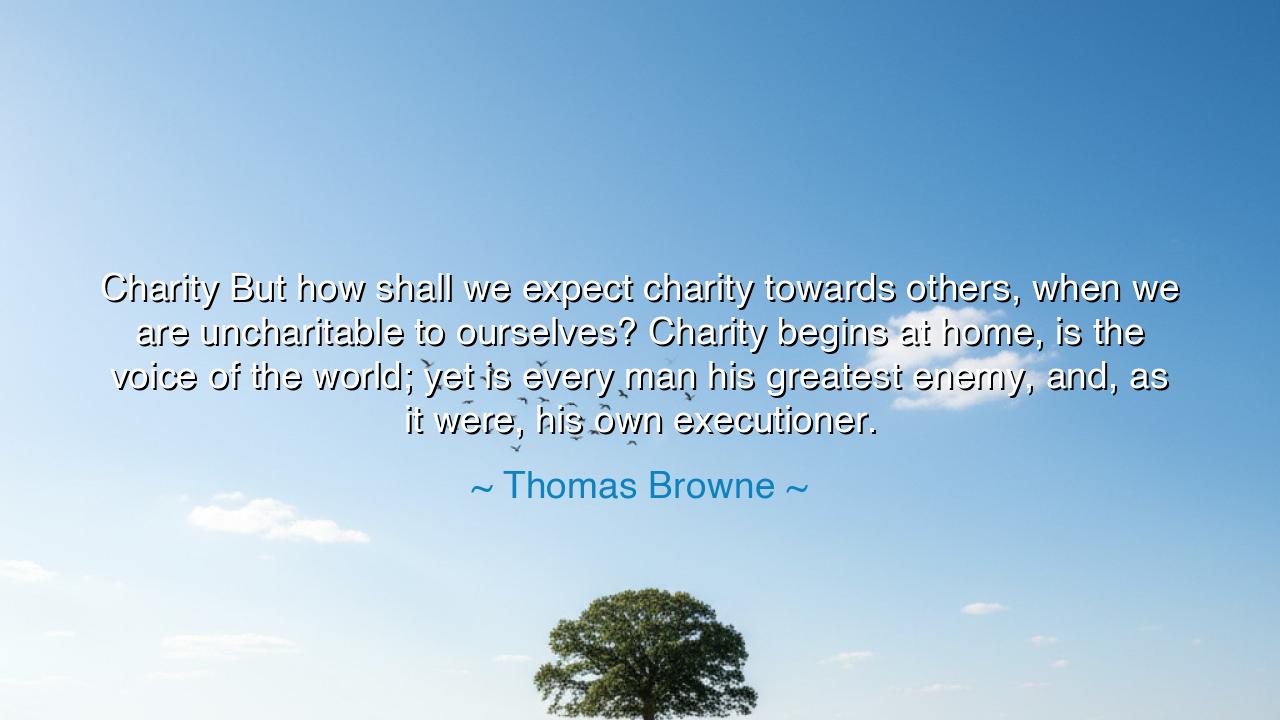
Charity But how shall we expect charity towards others, when we
Charity But how shall we expect charity towards others, when we are uncharitable to ourselves? Charity begins at home, is the voice of the world; yet is every man his greatest enemy, and, as it were, his own executioner.






In the words of Thomas Browne, the philosopher-physician of the seventeenth century, “Charity—But how shall we expect charity towards others, when we are uncharitable to ourselves? Charity begins at home, is the voice of the world; yet is every man his greatest enemy, and, as it were, his own executioner.” — we hear a meditation both solemn and luminous. His words reach across the centuries to touch the heart of every thinking soul. For what is charity, if not love in its purest form — love that gives, forgives, and seeks the good of all? Yet Browne, in his depth of insight, turns this virtue inward, asking us to face the shadow within: how can we hope to pour kindness into the world if we have not yet learned to love ourselves?
The meaning of this passage lies in the understanding that self-charity is the root of all true compassion. Browne does not speak of selfishness, nor of vanity, but of the sacred act of mercy toward one’s own being. Many imagine charity as something that begins with the giving of alms or the comfort of others, but the wise know that it begins within the human soul — in the forgiveness we grant ourselves, the patience we show toward our own failings, and the peace we allow our hearts to feel. He laments that man, instead of being his own friend, often becomes his own executioner, condemning himself with harsh judgment, envy, and regret. Thus, before one can extend love outward, one must heal the inward fracture of the spirit.
The origin of Browne’s wisdom is steeped in the spiritual and intellectual climate of his age. Living in a world of faith and philosophy, he sought harmony between the divine and the mortal. As a physician, he had seen the wounds of both body and mind; as a thinker, he had observed the disease of self-loathing that consumes humanity. His reflection on charity flows not from sentiment, but from experience — the recognition that no one can love well while living in inner war. For the heart that despises itself cannot truly nurture another. Charity begins at home, he writes, and by “home,” he means the soul itself — that inner dwelling where the spirit must first be made whole before it can bless the world.
Consider the tale of Prince Siddhartha, who became known as the Buddha. Born amidst luxury, he sought the cure for suffering — not only in the world, but within himself. He saw that men are their own tormentors, chained by desire and self-hatred. Only when he forgave himself, only when he ceased the war within, did he find enlightenment. In his serenity, compassion flowed boundlessly, touching all who crossed his path. Thus, his journey mirrors Browne’s truth: that to heal the world, one must first heal oneself; to love humanity, one must first make peace with one’s own heart.
Browne’s lament that “every man is his greatest enemy” remains as true today as it was in his time. How often does the human mind become a battlefield? How often do we crucify ourselves with guilt, envy, and self-contempt? The harshest judgments often come not from others, but from the mirror. We destroy our own peace in ways no stranger could — through regret over what cannot be changed, through the pursuit of impossible ideals, through the quiet denial of our own worth. And so Browne’s question rises like a bell in the stillness: how can a heart so torn offer peace to another?
Yet his message is not despair, but awakening. He reminds us that to show charity toward oneself is not weakness, but strength — for mercy begins where understanding dawns. To be gentle with one’s soul is to honor the Creator, to recognize that the divine spark within us deserves care, not condemnation. Once we embrace this truth, we can see others through the same compassionate lens. The heart that forgives itself becomes a vessel through which forgiveness can flow endlessly outward. In learning to love the self, we do not shrink into selfishness; rather, we expand into the fullness of empathy.
The lesson of Browne’s wisdom is this: be not your own enemy, but your own healer. When you fail, forgive; when you err, learn; when you are weary, rest. Speak to yourself as you would to a beloved friend. Only from such inward peace can outward goodness be born. For the world is filled with those who preach kindness yet live in quiet self-destruction — but the truly charitable soul is one that has first turned mercy inward, letting it take root and flower into compassion for all.
And so, my children, remember this teaching: charity begins at home, but home is not your house — it is your heart. Tend to it. Be patient with your own becoming. Love yourself not with vanity, but with reverence, as you would care for something sacred. When the storms of self-reproach rise within you, quiet them with kindness. For when you learn to love yourself rightly, you will find that love overflows — to friends, to strangers, to all creation. Then, and only then, will Browne’s vision be fulfilled: a world where men are no longer their own executioners, but their own redeemers.






AAdministratorAdministrator
Welcome, honored guests. Please leave a comment, we will respond soon